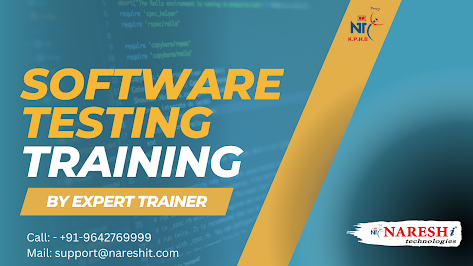- Get link
- X
- Other Apps
- Get link
- X
- Other Apps
Software testing, which involves assessing a software program or system to find any differences between predicted and actual outcomes, is an essential stage in the software development lifecycle (SDLC). Software testing's main goal is to confirm that the program satisfies the requirements, operates as intended, and is resilient and dependable.
Key components of software testing include the following:
Processes for both validation and verification are included in software testing. Whereas validation makes sure the program satisfies the needs and expectations of the user, verification makes sure the program complies with its standards and requirements.
.
Testing Types: There are many different kinds of testing, such as:
Functional testing: This kind of testing confirms that the program operates in accordance with its requirements and as intended.
Testing of features including scalability, security, usability, performance, and dependability is referred to as non-functional testing.
Human testers conducting manual testing without the use of automated tools is known as manual testing.
Automated testing is the process of running test cases via automated technologies and comparing the results to what was expected.
Unit testing is the process of testing separate software modules or components separately.
Testing the communication between modules or integrated components is known as integration testing.
System testing is the process of testing the program system as a whole.
Acceptance testing is the process of testing software to see if it satisfies acceptance requirements and is prepared for deployment.
Test Plans and Cases: In software testing, test plans and cases are created in accordance with requirements and specifications. Test cases provide the precise conditions to be examined as well as the results that are anticipated.
Defect Management: It's possible to find flaws or faults during testing. To assure the quality of the software, defect management include tracking, reporting, prioritizing, and fixing these issues.
Continuous Testing: As agile and DevOps approaches have grown in popularity, continuous testing has become crucial. In order to guarantee the quality of software increments and offer quick feedback, testing must be included throughout the SDLC.
Regression Testing: Following software modifications, regression testing is carried out to make sure That functionality that is currently in place is unaffected.
All things considered, software testing is essential to producing high-caliber software products that satisfy user needs, operate dependably, and offer a satisfying user experience.
Who is going to take this course?
People who work in the software development industry, including developers, testers, project managers, students, and professionals wishing to advance in their professions or change careers.
To improve possibilities for employment, improve the caliber of software, and maintain relevance in the computer sector.
- Get link
- X
- Other Apps

Comments
Post a Comment